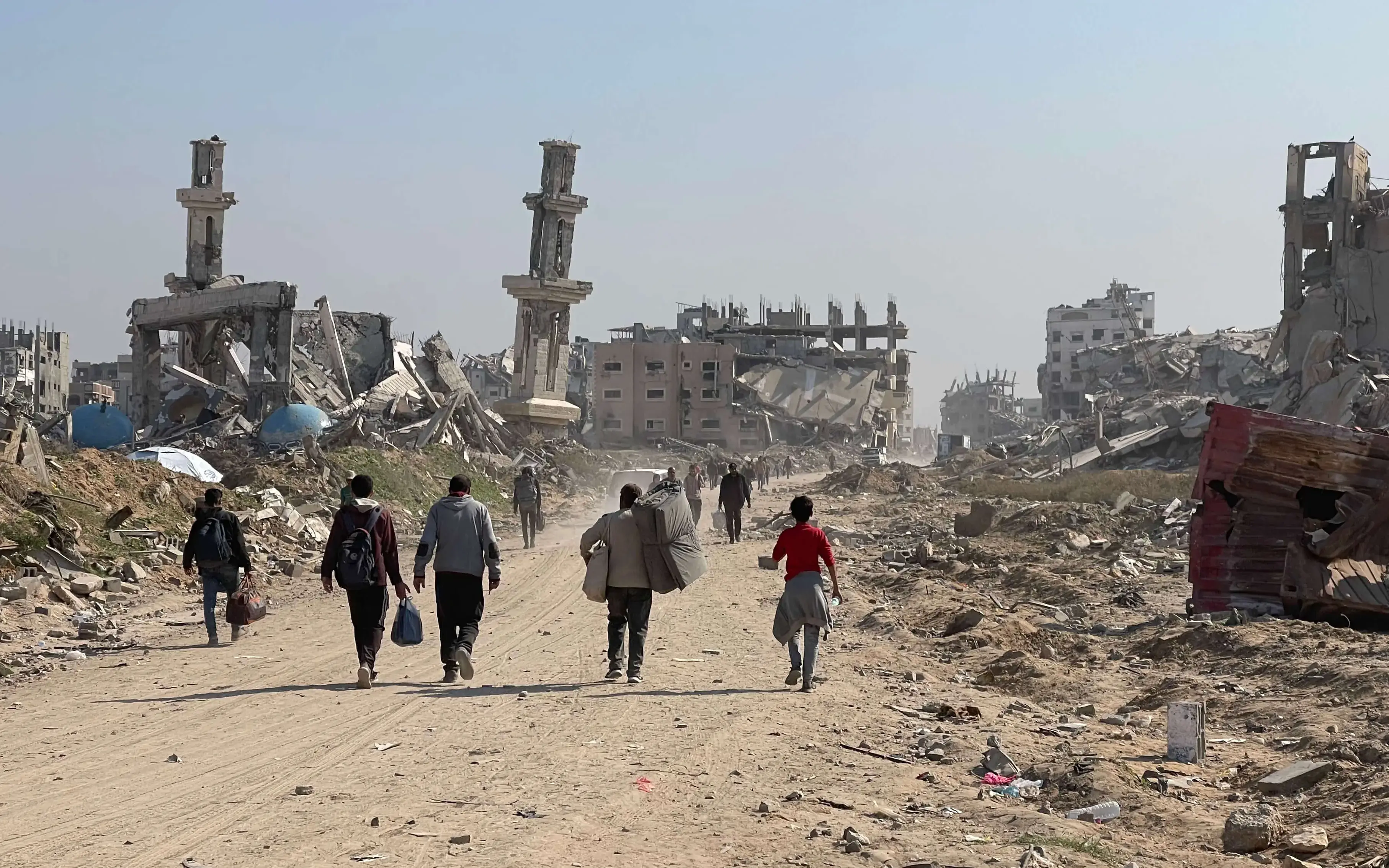News
From Outrage to Action: ‘Act X Palestine’ Drives a Global Mobilization for Palestine from Barcelona
The international campaign presents a programme packed with political, cultural and sports events to denounce impunity and foster a collective response to the situation in Palestine and many other peoples around the world.
Barcelona has long prided itself on being a leading city in the defence of human rights and the fight against injustice. It is proving this once again by becoming the epicentre of 'Act X Palestine', an international mobilization campaign born as a broad collective call against impunity and for a just and lasting peace in Palestine. The initiative, promoted by major Palestinian human rights, humanitarian and cultural organizations, is supported by an extensive network of European and Arab-world entities.
One of them is the International Institute for Nonviolent Action (Novact), involved in organising the initiative, which “aims to move from awareness to action, from indignation to mobilization,” summarizes Nora Miralles, a researcher at the institute. She advocates transforming the pain caused by situations such as the genocide perpetrated by Israel in Palestine —but also others, such as the occupation and rights violations suffered by the Sahrawi people for decades— into “collective action and shared hope”.
With the ambition of becoming a sounding board to denounce the injustices and oppressions perpetuated around the world, 'Act X Palestine' arises primarily as a response to the context of the situation devastating Palestine, which has reached a point of no return “after almost eighty years of occupation, apartheid and systematic human rights violations,” Miralles notes. The campaign focuses on the impunity that has enabled the genocide in Gaza and warns that what happens today in Palestine will shape the future of peoples across the world.
In this regard, the initiative seeks to go beyond denunciation and articulates five core demands: ending impunity; dismantling occupation and apartheid; guaranteeing the Palestinian people’s right of return; ensuring unconditional access to humanitarian aid and rebuilding Gaza under Palestinian leadership; and enforcing an arms embargo on Israel.
All these demands add to the call to end the systematic persecution suffered by Palestinian human rights organizations, “some of them literally for bringing Israel before the International Criminal Court,” says Miralles, who hopes the initiative will help “build a dynamic of support for human rights organizations”.
Barcelona, the Epicentre of a Campaign with a Strong Programme
The choice of the Catalan capital as the campaign’s focal point is no coincidence. “Barcelona was chosen, on one hand, because we want to mark the thirtieth anniversary of the Barcelona Process agreements, an attempt to establish cooperation in the Mediterranean region, which is being reviewed this year; and also because it is one of the cities most openly aligned in favour of peace, human rights, and against the genocide in Palestine,” the researcher explains.
The campaign will also commemorate the fiftieth anniversary of the Green March into Western Sahara, the strategy devised by Morocco to begin the occupation of Western Sahara —an occupation that persists today and continues to subjugate the Sahrawi people.
Over several days, the city will host talks, international meetings, screenings, and sports, cultural and street actions. The programme is packed with activities, including the Unsilence Forum, a Euro-Mediterranean gathering for peace, justice and democracy in the face of authoritarianism; and the campaign’s launch event on 15 November at Sala La Paloma, featuring the premiere of Massive Attack’s audiovisual manifesto 'Who Will Be the Watershed?'.
One of the campaign’s highlights will be the historic football match between the Catalonia and Palestine national teams on 18 November at the Lluís Companys Olympic Stadium. The organisers hope to fill it to the brim, despite the challenges of staging such an event. “Filling the Olympic Stadium will be the big challenge —we’re talking about thousands of people and a match on a Wednesday, midweek,” says Miralles. She adds: “Even so, preregistration has already shown that people want to be there: buses are being organised from many towns, and a massive mobilization is needed to show we are a citizenry capable of responding to what is happening.”
The programme continues with a series of solidarity concerts running until 23 December, with performances in various venues and cities across Catalonia. It will culminate with a large Christmas concert at Barcelona’s Razzmatazz on 23 December featuring artists such as Figa Flawas, Maria Jaume, The Tyets and Mushka, among others. The final closing event will take place on 29 January at the Palau Sant Jordi with the “Manifest X Palestine” concert.
In addition, the campaign will include simultaneous events in other cities —such as Tunis, Paris, Brussels, and Ramallah— and plans to remain active throughout 2025 with decentralised, coordinated actions at the international level.
Turning Outrage into Collective Action
Miralles traces the origins of 'Act X Palestine' to “the need of Palestinian organisations to shake European consciousness and build real alliances at a Euro-Mediterranean scale”. For the researcher, the project stems from a dual impulse: “On one hand, it is a direct response to the suffering and persecution of the Palestinian human rights movement; and on the other, it is a collective outcry in the face of the rise of authoritarianism everywhere, including the Mediterranean.” She cites Tunisia as an example, where “feminist associations are being outlawed, and no one is talking about it.” For this reason, 'Act X Palestine' seeks to contribute to building an alternative model of regional cooperation based on peace and human rights.
The campaign aims to centre attention on the current context, marked by the devastation in Gaza, with more than 90% of infrastructure destroyed and thousands of people displaced, its organisers recall.
Miralles believes two processes are unfolding in parallel: one is a widespread sense of the collapse of norms and international law, which has enabled Israel’s impunity; the other is a growing social impulse “to take action, mobilise and raise awareness” in response. Still, she acknowledges that “even though more and more people are mobilising, we need to be many more”.
The campaign’s proceeds will go entirely to Palestinian organisations working on the ground. Support will be directed to humanitarian aid and reconstruction in Gaza, particularly in health and agriculture, as well as to human rights organisations grouped under the Palestinian Human Rights Organizations Council (PHROC), which fight against impunity. A portion of the funds will also strengthen the Palestinian Performing Arts Network (PPAN), which defends culture as a space of dignity and resistance.
For its organisers, the strength of 'Act X Palestine' lies in its cross-cutting, intersectional nature. It is not only a campaign for Palestine, but for all struggles for global justice, from Sudan to Congo to Western Sahara. “The biggest challenge ahead is to awaken consciousness so we can understand where the world is headed —and mobilise to turn things around and move it towards where many of us want it to go,” Miralles concludes.
One of them is the International Institute for Nonviolent Action (Novact), involved in organising the initiative, which “aims to move from awareness to action, from indignation to mobilization,” summarizes Nora Miralles, a researcher at the institute. She advocates transforming the pain caused by situations such as the genocide perpetrated by Israel in Palestine —but also others, such as the occupation and rights violations suffered by the Sahrawi people for decades— into “collective action and shared hope”.
With the ambition of becoming a sounding board to denounce the injustices and oppressions perpetuated around the world, 'Act X Palestine' arises primarily as a response to the context of the situation devastating Palestine, which has reached a point of no return “after almost eighty years of occupation, apartheid and systematic human rights violations,” Miralles notes. The campaign focuses on the impunity that has enabled the genocide in Gaza and warns that what happens today in Palestine will shape the future of peoples across the world.
In this regard, the initiative seeks to go beyond denunciation and articulates five core demands: ending impunity; dismantling occupation and apartheid; guaranteeing the Palestinian people’s right of return; ensuring unconditional access to humanitarian aid and rebuilding Gaza under Palestinian leadership; and enforcing an arms embargo on Israel.
All these demands add to the call to end the systematic persecution suffered by Palestinian human rights organizations, “some of them literally for bringing Israel before the International Criminal Court,” says Miralles, who hopes the initiative will help “build a dynamic of support for human rights organizations”.
Barcelona, the Epicentre of a Campaign with a Strong Programme
The choice of the Catalan capital as the campaign’s focal point is no coincidence. “Barcelona was chosen, on one hand, because we want to mark the thirtieth anniversary of the Barcelona Process agreements, an attempt to establish cooperation in the Mediterranean region, which is being reviewed this year; and also because it is one of the cities most openly aligned in favour of peace, human rights, and against the genocide in Palestine,” the researcher explains.
The campaign will also commemorate the fiftieth anniversary of the Green March into Western Sahara, the strategy devised by Morocco to begin the occupation of Western Sahara —an occupation that persists today and continues to subjugate the Sahrawi people.
Over several days, the city will host talks, international meetings, screenings, and sports, cultural and street actions. The programme is packed with activities, including the Unsilence Forum, a Euro-Mediterranean gathering for peace, justice and democracy in the face of authoritarianism; and the campaign’s launch event on 15 November at Sala La Paloma, featuring the premiere of Massive Attack’s audiovisual manifesto 'Who Will Be the Watershed?'.
One of the campaign’s highlights will be the historic football match between the Catalonia and Palestine national teams on 18 November at the Lluís Companys Olympic Stadium. The organisers hope to fill it to the brim, despite the challenges of staging such an event. “Filling the Olympic Stadium will be the big challenge —we’re talking about thousands of people and a match on a Wednesday, midweek,” says Miralles. She adds: “Even so, preregistration has already shown that people want to be there: buses are being organised from many towns, and a massive mobilization is needed to show we are a citizenry capable of responding to what is happening.”
The programme continues with a series of solidarity concerts running until 23 December, with performances in various venues and cities across Catalonia. It will culminate with a large Christmas concert at Barcelona’s Razzmatazz on 23 December featuring artists such as Figa Flawas, Maria Jaume, The Tyets and Mushka, among others. The final closing event will take place on 29 January at the Palau Sant Jordi with the “Manifest X Palestine” concert.
In addition, the campaign will include simultaneous events in other cities —such as Tunis, Paris, Brussels, and Ramallah— and plans to remain active throughout 2025 with decentralised, coordinated actions at the international level.
Turning Outrage into Collective Action
Miralles traces the origins of 'Act X Palestine' to “the need of Palestinian organisations to shake European consciousness and build real alliances at a Euro-Mediterranean scale”. For the researcher, the project stems from a dual impulse: “On one hand, it is a direct response to the suffering and persecution of the Palestinian human rights movement; and on the other, it is a collective outcry in the face of the rise of authoritarianism everywhere, including the Mediterranean.” She cites Tunisia as an example, where “feminist associations are being outlawed, and no one is talking about it.” For this reason, 'Act X Palestine' seeks to contribute to building an alternative model of regional cooperation based on peace and human rights.
The campaign aims to centre attention on the current context, marked by the devastation in Gaza, with more than 90% of infrastructure destroyed and thousands of people displaced, its organisers recall.
Miralles believes two processes are unfolding in parallel: one is a widespread sense of the collapse of norms and international law, which has enabled Israel’s impunity; the other is a growing social impulse “to take action, mobilise and raise awareness” in response. Still, she acknowledges that “even though more and more people are mobilising, we need to be many more”.
The campaign’s proceeds will go entirely to Palestinian organisations working on the ground. Support will be directed to humanitarian aid and reconstruction in Gaza, particularly in health and agriculture, as well as to human rights organisations grouped under the Palestinian Human Rights Organizations Council (PHROC), which fight against impunity. A portion of the funds will also strengthen the Palestinian Performing Arts Network (PPAN), which defends culture as a space of dignity and resistance.
For its organisers, the strength of 'Act X Palestine' lies in its cross-cutting, intersectional nature. It is not only a campaign for Palestine, but for all struggles for global justice, from Sudan to Congo to Western Sahara. “The biggest challenge ahead is to awaken consciousness so we can understand where the world is headed —and mobilise to turn things around and move it towards where many of us want it to go,” Miralles concludes.







Add new comment